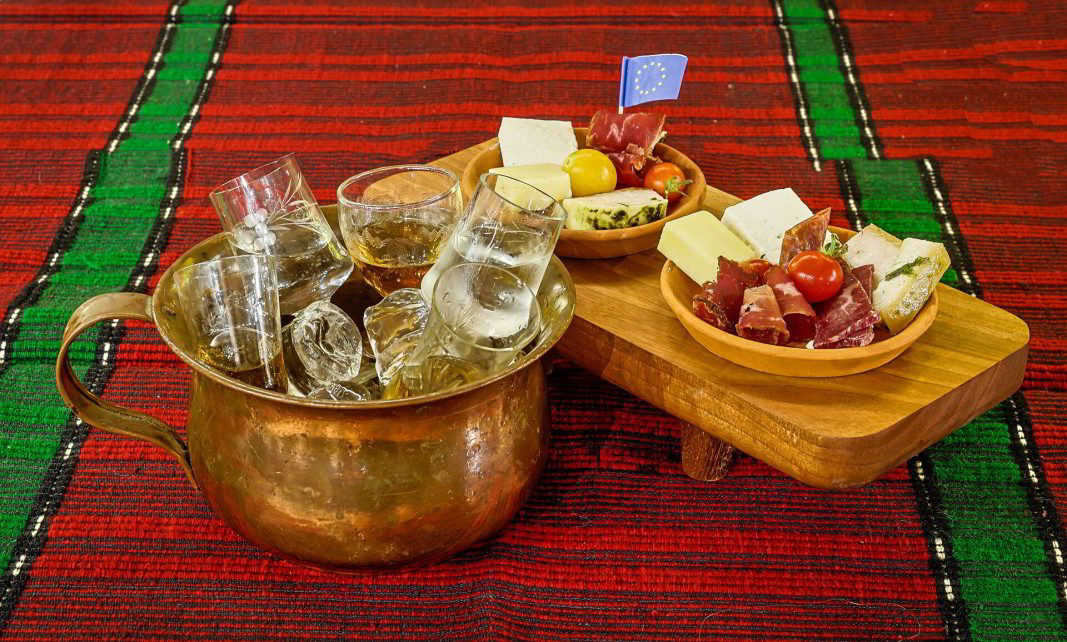Rakia (fruit brandy) is the queen of the drinks on the Balkans. “We can say that it originates from the Arab world, from the drink Arak. But Bulgarian rakia is unique and we are very proud of our rakia, especially the grape variety," Ivaylo Zheglov, creator of the first Rakia Museum in this country and organizer of the Rakia and Spirits Fest Sofia says.

The place, which is located in the heart of Sofia, opened its doors in mid-September and offers an authentic immersion in the native traditions related to the technology of distilling the drink, the types of rakia and its consumption.

As soon as you enter the museum, you will be greeted with a dose of humor by several large dolls dressed in traditional village clothes and decorated with some of the symbols of our past. People can see a recreated clay pot - the first type of pot used for distilling rakia in Bulgarian lands. The well-known copper pot still is also on display, as well as a model of a distillation column for commercial production.

"People distilled rakia in our lands before the times of the Ottoman oppression," Ivaylo Zheglov tells us. It was originally used for medicinal purposes, as various tinctures were prepared and the alcohol was also used for cleaning wounds. After the 1930s, people in the villages began to produce rakia en masse as it was the cheapest way to have a strong drink for all important life events, such as weddings, baptisms, funerals.

"Each visitor receives an audio guide that provides information about the distillation technology, the history of rakia, various jokes part of Bulgarian culture related to the drink, and the proper way to drink it. An interesting thing about us is that Bulgarians drink rakia in a completely different way in comparison to other nations and their hard drinks, such as whiskey and cognac. We drink rakia as an aperitif - with salad, meat or dairy appetizers, pickles. Only after that we move on to dinner. In the rest of the world, people do it the other way around – they usually drink alcohol after the main meal, as a digestif," the creator of the Rakia Museum in Sofia says.

After getting acquainted with history, we can sit at the bar and try rakia from the museum's rich collection. Here one can find various types of rakia, mostly Bulgarian, but you can also try some Balkan varieties. There is no Balkan conflict, says Ivaylo Zheglov with a smile and points out that the Bulgarian grape rakia is recognized by everyone as the best. Bulgaria is the only country where you can try rose rakia from the region of Kazanlak and Karlovo. These days one can find rakia made from melons or exotic fruits. According to Ivaylo Zheglov, there are quite successful Bulgarian experiments, such as rakia with truffles or rakia with saffron.

"Foreigners find it a bit strong. They like the fruit varieties more. Visitors really like pear and quince rakia. Some do not even know what quince is, but they are impressed by the aromatic drink. And when we get to the dogwood berries, they are really surprised." Ivaylo Zheglov says with a smile.
For drivers, there is a special aromatizer in the museum, so they can feel the aroma of different types of rakia without consuming. The main goal of the Rakia Museum in Sofia is to be an ambassador of Bulgarian rakia to the world.

"We want to show foreigners our traditions, our liquid heritage, which we should be proud of like the Scots are proud with their whiskey or the Caribbean countries with their rum. Our rakia is a truly unique drink," Ivaylo Zheglov says. And like a true "queen of the drinks” rakia should be enjoyed responsibly. If you're still wondering how to recognize good rakia, the answer is simple:
"In the morning! If you don’t have a headache, then the rakia was good," Zheglov says.
See also:
Bulgarian folklore groups from 17 European countries have arrived in Palma de Mallorca to take part in a big horo chain dance, part of the In the Town Square of the Other Bulgaria festival. "We are looking forward to arriving, to meeting old colleagues..
“When there are shared goals and a desire to understand, the Bulgarian community in Athens is demonstrating it is part of the diverse European family with a unique language, culture and traditions.” 2024 started with these words, posted on Facebook,..
In a previous publication Radio Bulgaria offered an overview of the conditions and grounds for acquiring Bulgarian citizenship . In the following lines we will elaborate on the steps of the procedure itself. The first one is to submit an..
Bulgarian folklore groups from 17 European countries have arrived in Palma de Mallorca to take part in a big horo chain dance, part of the In the Town..
“When there are shared goals and a desire to understand, the Bulgarian community in Athens is demonstrating it is part of the diverse European family..

+359 2 9336 661
